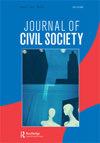Intergroup contacts in civil society organizations and trust: How neighbourhood diversity moderates the role of intergroup contacts
IF 0.9
Q3 POLITICAL SCIENCE
引用次数: 0
Abstract
ABSTRACT When dealing with the complex policy issue of how to maintain social cohesion within an increasingly diverse society, decision-makers often view civil society organizations as important actors that can provide opportunities for intergroup contacts and pathways for immigrants to integrate. The present study uses data from a large-scale survey directed toward individuals nested within 36 different local communities and over 1250 different neighbourhoods with varying levels of visible minorities. The results contribute by showing that it is important to consider not only the frequency of intergroup contacts but also the context in which those who are involved in civil society organizations live. Those who are involved in civil society organizations at the local level are embedded in local contexts that moderate how respondents perceive whether others are to be trusted. Very frequent intergroup contacts within civil society organizations correlated more strongly with higher levels of community and outgroup trust among those with native backgrounds who lived in diverse neighbourhoods. Similarly, the results indicated that perceptions of intergroup contact mattered. Neighbourhood diversity and outgroup trust were statistically significant only for those who perceived intergroup contacts to be very positive or rather positive.民间社会组织中的群体间接触与信任:社区多样性如何调节群体间接触的作用
在处理如何在日益多样化的社会中保持社会凝聚力这一复杂的政策问题时,决策者往往将民间社会组织视为重要的行为体,可以为群体间的接触提供机会,并为移民提供融入的途径。目前的研究使用了一项大规模调查的数据,调查对象是36个不同的当地社区和1250多个不同的社区,这些社区有不同程度的少数族裔。研究结果表明,不仅要考虑群体间接触的频率,而且要考虑参与民间社会组织的人所处的环境,这一点很重要。那些在地方一级参与民间社会组织的人融入当地环境,这缓和了受访者对他人是否值得信任的看法。民间社会组织内部非常频繁的群体间接触与居住在不同社区的具有本土背景的人之间更高水平的社区和群体外信任有着更强的相关性。同样,结果表明,对群体间接触的看法很重要。邻里多样性和外群体信任仅对那些认为群体间接触非常积极或相当积极的人有统计学意义。
本文章由计算机程序翻译,如有差异,请以英文原文为准。
求助全文
约1分钟内获得全文
求助全文

 求助内容:
求助内容: 应助结果提醒方式:
应助结果提醒方式:


